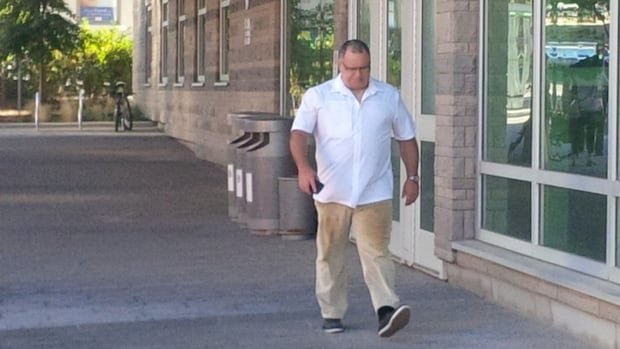WARNING: This story contains details of sexual assault and may affect those who have experienced sexual violence or know someone affected by it.
The man who sexually assaulted and killed 23-year-old Hamilton nursing assistant Diane Werendowicz in 1981, and who was convicted in 2016 of first-degree murder at his fourth trial, has a chance of being released from prison early.
Robert Badgerow, 66, received the mandatory sentence of life in prison without the possibility of parole for 25 years, meaning he would not normally be allowed to apply until 2032.
But under the Penal Code’s Faint Hope Clause, Badgerow was allowed to apply for a judicial review of his sentence after serving 15 years, and the request was granted. The clause was repealed in 2011, but remains an option for people serving sentences for murder committed before December 2 of that year.
Badgerow’s hearing began Monday before a 12-person jury at the Ontario Superior Court of Justice in Hamilton and is expected to last three weeks.
The jury will decide whether Badgerow will be allowed to apply for early parole, after the Crown and defense present their arguments about his character, conduct in prison, nature of the crime and lasting impact on Werendowicz’s family. Badgerow is also expected to testify.
Crown attorney Cheryl Gzik, who successfully prosecuted Badgerow in 2016 in Kitchener, told jurors he is a “wolf in sheep’s clothing” who should not be given the opportunity for early release.
“Robert Badgerow is deceitful, has shown no remorse or insight into his behavior and denies the offence,” Gzik said.
Badgerow, who stands more than six feet tall, has a long white beard and wore glasses, jeans and a green jacket in court, had his head bowed in the prisoner’s box as he took notes in a large paper notebook.
He maintains his innocence but “respects” the criminal justice system, defense attorney Aditi Iyer told the jury.
“Please think about how much a person can change after 43 years.”
Convicted after 4 trials
Badgerow’s case is unique in another way: he was the first person in Canadian legal history to be tried for the same murder four times.
Throughout the legal proceedings, including multiple appeals and mistrials, he spent several years in protective custody and on bail, both of which counted toward his parole eligibility date.
One night in 1981, Werendowicz was walking home from a Stoney Creek bar after celebrating his upcoming birthday with friends.
That’s when she encountered Badgerow, who dragged her into a wooded ravine and sexually assaulted her, Gzik said in her opening statement Monday.
He strangled her with the strap of her bag and dumped her half naked in a stream with a tire on top of her head so that there was “no possible chance of recovery,” Gzik said.
“It was a brutal and horrible murder. It was not just rape, but rape, strangulation and drowning.”

The next day, some children playing in the area discovered Werendowicz’s body.
The case remained a mystery for 17 years, until advances in DNA technology led to a breakthrough.
In the late 1990s, investigators were able to extract DNA collected from semen found on Werendowicz’s body and jeans, and compare it to Badgerow’s DNA collected from a Tim Hortons soup spoon.
It was a coincidence and he was arrested in 1998.
At that time he worked in what was then called Dofasco and was married and the father of three children.
Badgerow claimed that he and Werendowicz had consensual sex in the back seat of his car after she left the bar, and before they separated and someone else killed her. He pleaded not guilty.
A jury found him guilty in 2001, but the case was overturned on appeal.
Two more trials followed, in 2010 and 2011, which ended in mistrials.
A judge then ordered a stay of proceedings, effectively ending the prosecution, and Badgerow was freed for a year and a half.
But in 2014, the Ontario Court of Appeal ordered a fourth trial based on evidence suggesting Badgerow had called 911 from a phone at Dofasco’s Gate 6 in the days after Werendowicz’s murder.
The caller had incriminating information that only the killer would know.
A jury found Badgerow guilty.
He attended his mother’s funeral last year.
In total, he has spent 11 years in preventive custody, nine years on bail and six years serving his sentence, Iyer said.
Now he’s not asking the jury for mercy, “but for an opportunity to ask for mercy,” he said.
Probation officer Shona Donovan testified that Badgerow is considered a low risk to reoffend, gets along well with other male inmates, completed his high school diploma and worked several prison jobs. He has completed a course designed to help sex offenders, although he has not admitted sexually assaulting Werendowicz.
“He was an active participant who came forward motivated,” Donovan read in a report to the jury. “Although he denied committing the crime, he was able to address past behaviors that were problematic.”
Last year, Canada’s parole board determined his risk was low enough to grant him a “rare” compassionate leave from the Warkworth Institution, Donovan said. Prison guards escorted him out of the prison for two hours to attend his mother’s funeral.
If the jury unanimously agrees to allow Badgerow to apply for early parole, then a two-thirds majority decides how many years he must serve first.
For anyone who has been sexually assaulted, support is available through crisis lines and local support services through Partnership to End Violence Canada Database.








